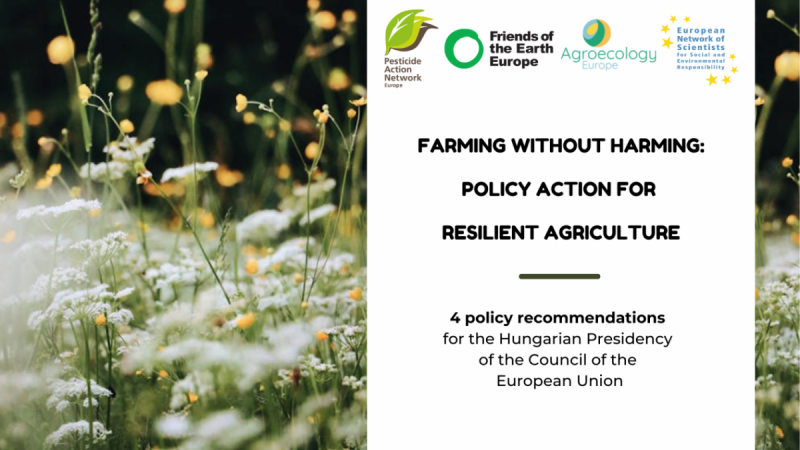On 26 June 2024, Pesticide Action Network Europe, Friends of the Earth Europe, The European Network of Scientists for Social and Environmental Responsibility, and Agroecology Europe convened policymakers, scientists, farmers, and civil society to highlight the potential of agroecological systems and integrated pest management (IPM) to decrease pesticide dependency and transition towards more resilient food systems.
In the words of Martin Dermine, Executive Director of PAN Europe, “Every year, around 10 products leave the EU market, because we realise after 40 years that they are toxic. The first victims of pesticide use are farmers, their families and neighbours. Neurodegenerative diseases are on the rise in exposed communities. PFAS pesticides and their metabolites are contaminating waterways, and we don’t know how to get rid of them. However, real IPM works, achieving up to much more than 50% reduction of pesticide use.” Solutions exist. We need the commitment of public authorities to enable their implementation and the systemic changes needed for the transition. They have the democratic support to phase out pesticides to better protect people's health and the environment.
It is against this reality that the Belgian Presidency released the Council conclusions on the future of agriculture in the EU. The document does not mention pesticides or agroecology once. While it emphasises the importance of climate resilience and a fair income and stable policy context for farmers, it continues to falsely posit ecosystem conservation against the competitiveness and profitability of agriculture. In integrated, agroecological systems, ecosystem biodiversity upholds farm resilience and profitability.
The EU Council presidency is now in the hands of Hungary. During the joint event, the representative of the Hungarian ministry of Agriculture expressed that working towards a new proposal to reduce pesticides is not a priority for the presidency, and that the initiative for new legislative proposals should come from the Commission. He referred to better implementation of IPM as a way to reduce pesticide use. In the conclusions on the the future of agriculture of the EU, the Council “calls on the Commission to provide an analysis about food systems approaches that put farmers centre stage and ensure affordable, sufficient, safe and sustainably produced food in the Union” and to “strengthen the position of farmers in the food chain, to ensure that they receive fair remuneration for the goods and services they provide to society and to stimulate the demand and remuneration for sustainably produced agricultural products”.
Expert discussions from the joint event offer 4 policy recommendations for the freshly started Hungarian Presidency of the Council of the European Union:
1. Better implement pesticide legislation and answer to citizens’ demands
Fully implement the current Sustainable Use of Pesticides Directive (SUD), through ensuring the effective implementation of IPM and the protection of citizens’ health and the environment. Effectively work towards ambitious pesticide reductions to meet Green Deal objectives and respond to the demands of European citizens, such as expressed in the European Citizens’ Initiative ‘Save Bees and Farmers’. Provide towns the regulatory framework to become organic and pesticide-free.
2. Support farmers in the transition
Better support farmers to transition to agroecological practices, and reward farmers who foster ecosystem benefits and work for soil health, biodiversity and the reduction of pesticides. Redirect CAP funding and other EU funding schemes away from the industrial model of production to ensure an agroecological transition for the sector. Offer independent farm advisory services trained in IPM and agroecology to support farmers in their transition journey to restore soil health, increase resilience of cropping systems and reduce the use of pesticides.
3. Fund small, radical, pioneering projects
Channel funding into pioneering small-scale niche projects and programmes that promote radical changes in the food system in integrity with agroecological principles. Focus funding on the implementation of IPM and uptake of agroecology. Foster access to data and transparency on funding streams to strengthen accountability of public spending for the public good, while upholding the “polluter pays” principle moving towards a system of true cost accounting.
4. Invest across the food system
EU institutions must make long-term, holistic investments in food system transformation despite short-term political agendas. Recalling the precautionary principle, start by harmonising regulations to make pesticide reduction a reality. Put an end to harmful policies and subsidies and integrate agroecology as the mainstream agriculture model. At a larger perimeter, pursue the research and different scales and governance levels. Fund projects that are dedicated to all levels and dimensions of food system change. In addition to research and projects, focus on action and regulation. Governments must facilitate short food supply chains, for production and marketing, including public procurement to provide pesticide-free foods in schools and hospitals.
Read more:
